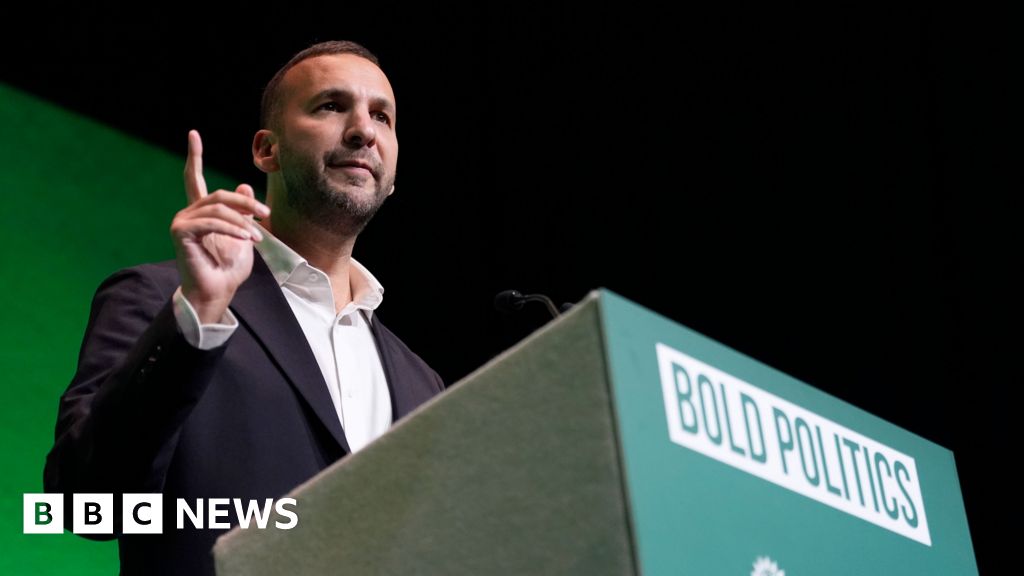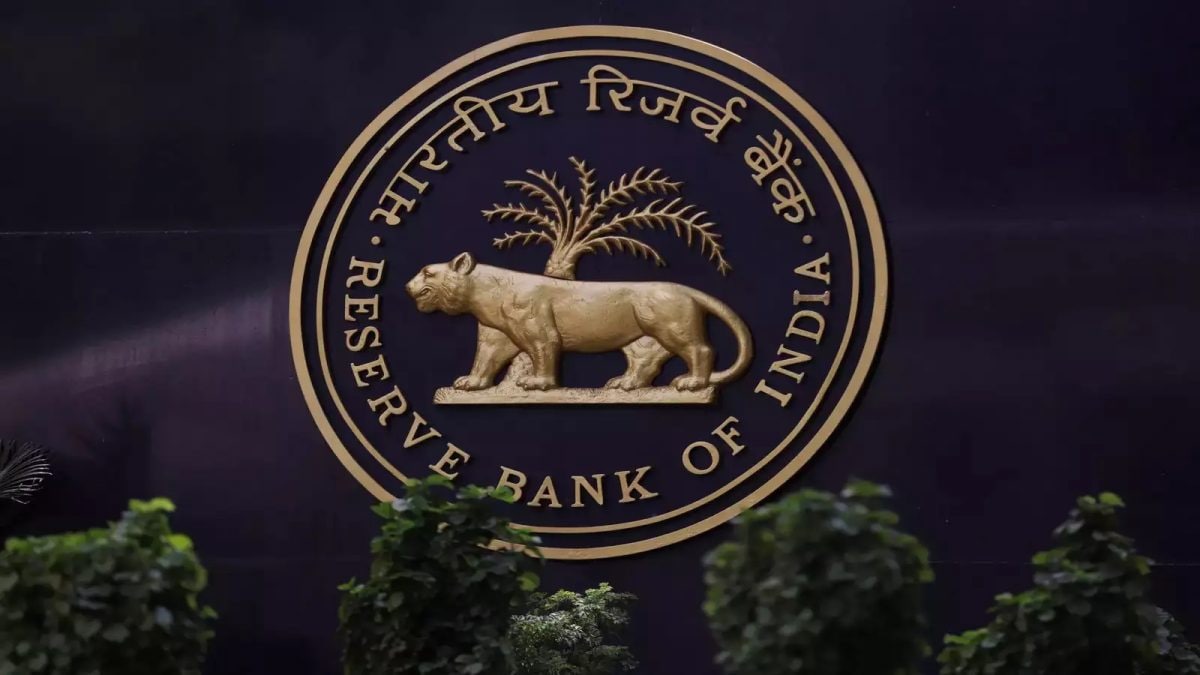Business
Tax wealthiest to end rip-off Britain, says Green leader Polanski

Kate WhannelPolitical reporter
Newly-elected Green Party leader Zack Polanski has told his party’s conference a tax on the wealthiest would end “rip-off Britain” and make the country “an affordable” place to live.
Addressing members in Bournemouth, he said taxing the assets of the richest 1% would enable the government to fund universal free childcare, special needs education and rural bus routes.
He also defended migrants and refugees to loud applause from the audience and accused Labour of being “handmaidens” of Reform UK adding: “When Farage says jump, Labour asks ‘how high’.”
Polanski has described himself as an “eco-populist” and is seeking to shift the party to the left to take on Sir Keir Starmer’s Labour Party.
The prime minister has sought to tighten immigration controls in recent months, in what is being seen by critics as a response to Reform leading national opinion polls.
But Sir Keir launched an attack on Reform leader Nigel Farage in his Labour conference speech this week, accusing him of sowing division and not believing in Britain – something denied by Farage.
Polanski described Farage as a “Trump-loving corporate stooge” and accused Sir Keir of jumping to his tune.
Unusually for a speech by a Green Party leader, Polanski did not focus primarily on the environment.
He told the conference: “You can not be an effective environmentalist without talking about the deep inequality in our society.”
Much of his speech centred on the problems posed by the cost of living, pointing to a rise in homelessness, tenants worried about their rent and families struggling to pay bills.
Polanski argued that the country’s problems were “rooted in an economic model built on austerity and privatisation” but that the Green Party would “break the shackles of poverty and hardship that lock so many in”.
“This is a country with so much going for it, but we have been failed time and time again by a political class poisoned by extreme wealth and you can see that poison everyday.”
“A country where a tiny few have taken our power and wealth. Things must change. It’s time to take it back.”
He said some voters might worry that they could be hit by taxes on the wealthiest being proposed by his party.
“Hairdressers and plumbers say understandably ‘I’ve worked hard all my life. Why are you taxing me? Why are you taxing my ambition?'”
However, Polanski said he was targeting people who “will make more money in one night than everyone in this room could probably earn in an entire year”.
In a 20 minute speech, Polanski told the conference his party’s “horizons” would not be “narrow” and that he would “not be silent” on “the mass slaughter in Palestine”.
“We must stop selling arms to Israel, we must stop sharing intelligence,” he said.
He also criticised what he called a “draconian crackdown on the right to protest”.
“From terrorist proscription against protesters, to banning journalists from their conference, to diving into a rushed evidence-free plan for digital IDs that are likely to discriminate against minorities – the alarm bells of authoritarianism are now ringing.”
In his defence of refugees and migrants, Polanski said it was the “economic system” that was a “threat to the places we love… not people arriving small boats”.
To loud cheers from party members he declared: “We’ll say it loud, we’ll say it clear migrants and refugees are welcome here.”
He said the Greens wanted to stop small boats crossing the Channel through “safe and legal routes”.
He also blamed “a politics that tries to divide us and points the finger at each other, instead of at billionaires”.
In a contrast with comments from Sir Keir earlier this year, who said the UK risked becoming an “island of strangers”, Polanski said: “This is a nation of neighbours.”
He said defending migration was important to him because of his own “confused and muddled” Jewish ancestry, which saw his family flee from Latvia to Ukraine to Poland and eventually to England.
Taking a moment to mark Thursday’s attack on a synagogue in Manchester, where Polanski grew up, he said “my heart is with the community.”
In the past year the Green Party has built on its success at the 2024 general election – when it won four MPs – by winning 74 seats in the local council elections.
Last month, Polanski was overwhelmingly backed by members in a leadership contest against the less combative duo of Green MPs Adrian Ramsay and Ellie Chowns.
Since the election the party says its membership has risen by 20% to an all-time high of 80,000.
Polanski, who is a member of the London Assembly but does not have a seat in Parliament, has expressed interest in working with the new party being set up by former Labour leader Jeremy Corbyn and former Labour MP Zarah Sultana.
Speaking after the leadership election, he said it was “too soon to talk about joining electoral coalitions”, but he was interested in working with “anyone who wants to challenge a failing Labour government and take on fascism and the far right”.

Business
LSEG boosts returns for shareholders amid activist investor pressure

The London Stock Exchange Group has unveiled plans for a £3 billion share buyback amid pressure from an activist investor and as artificial intelligence fears have hammered the stock.
LSEG said it would follow £2.1 billion in buybacks made last year with another £3 billion by February next year, on top of a hike in dividend payouts.
Details of the pledge to step up returns for investors came as it reported underlying operating profits of £3.51 billion for 2025, up 10.8% or 14.7% higher on a constant currency basis.
On a bottom line basis, pre-tax profits jumped 56.5% to £1.97 billion for 2025.
Shares in the group rose as much as 5% in Thursday morning trading, in a welcome increase after the stock has been battered in recent weeks by global investor concerns over the impact of AI on its firm and data companies more widely.
Shares in the firm, which makes a significant chunk of its earnings from selling access to markets data, have slumped by nearly a third in the past year.
Activist investor Elliott Management has also built up a stake in the firm earlier this month and has reportedly been pushing for more share buybacks as it has held talks with LSEG bosses.
In the face of the recent shares slump, chief executive David Schwimmer said recent results showed “another year of very strong financial performance”.
He said: “In the fourth quarter alone, major financial institutions signed long-term contracts worth £1.9 billion to access our leading data and workflow.”
“With our LSEG Everywhere data strategy, we are positioning ourselves as the partner of choice for licensed, trusted data as the use of AI in decision-making scales – and we are seeing very positive signs of adoption,” he added.
It outlined new performance guidance for 2027 to 2029, with aims to deliver “mid to high single digit” growth in total income and further increase profitability.
Despite taking a significant stake in LSEG, the Financial Times newspaper reported earlier this week that Elliott has made assurances to the UK government over its intentions for LSEG as speculation mounted it would look to push for a break-up of the firm or for it to switch its listing to New York.
Business
Rolls-Royce makes £1 billion more profit after major defence orders

Rolls-Royce has revealed its annual profit surged by £1 billion and upgraded its outlook for the years ahead, following major military aircraft orders and soaring demand for powering data centres.
The engineering giant said its business divisions were in a good place to benefit from “key global trends” over the coming years.
It reported an underlying operating profit of £3.5 billion for 2025, a jump of 40% from the £2.5 billion made the prior year.
Underlying revenues surpassed £20 billion over the year, up about a 10th on 2024.
This was driven by profit and sales growth across its civil aerospace, defence, and power businesses.
Rolls-Royce said demand for its defence products was strong and it secured major orders during 2025.
This included contracts worth more than £1.5 billion with the UK’s Ministry of Defence and the US’s Department of War for EJ200 and AE 2100 engines to power military aircraft.
New orders for the Eurofighter aircraft engines from Italy, Germany and Spain, as well as export agreements from Turkey, will drive production into the 2030s, it said.
Furthermore, Rolls-Royce said it was benefiting from growing demand for power generation, driven by data centres with revenues up by more than a third.
Rolls-Royce said it was now expecting underlying operating profits to increase to between £4.9 billion and £5.2 billion by 2028 following the strengthened financial performance in 2025.
This is significantly higher than the £3.6 billion to £3.9 billion range that it had previously been targeting.
Chief executive Tufan Erginbilgic said growth would not have been possible “before our transformation”, with the business making £600 million worth of cost savings since 2022.
“With our new capabilities and mindset, we have navigated challenges from supply chain to tariffs, and delivered a strong performance in 2025, all while we built the foundations for significant growth for years to come,” he said.
“Based on our 2026 guidance, we expect to deliver underlying operating profit within the prior mid-term guidance range two years earlier than planned.
“Beyond the mid-term we continue to see significant growth from existing businesses as well as from new business opportunities.”
Business
RBI’s Rs 25,000-Crore Switch Auction On March 2nd And Its Impact On Bond Markets, Government Debt Strategy | Explained

Last Updated:
RBI Switch Auction On March 2: The Reserve Bank of India will conduct a government securities switch auction worth Rs 25,000 crore on March 2 between 10:30 AM and 11:30 AM


In the latest exercise, all securities, having maturities in FY27, are being replaced with bonds maturing after FY32.
RBI Switch Auction On March 2: The Reserve Bank of India (RBI) will conduct a government securities switch auction worth Rs 25,000 crore on March 2 between 10:30 AM and 11:30 AM, with results to be declared the same day and settlement scheduled for March 4. The move marks the third such operation this month and is aimed at smoothing India’s future debt repayment profile.
What is a switch auction?
A switch auction is a debt management tool through which the government exchanges bonds that mature soon with bonds that mature later. Instead of repaying investors in cash when near-term securities mature, the government offers them longer-dated securities. This effectively postpones repayment obligations without increasing total debt.
In the latest exercise, all securities, having maturities in FY27, are being replaced with bonds maturing after FY32, according to RBI data.
Why is RBI conducting it now?
The key trigger is the heavy redemption pressure expected in FY27, when government securities worth about Rs 5.47 lakh crore are scheduled to mature. By replacing these with bonds maturing after FY32, the authorities are spreading repayment obligations across future years. This reduces refinancing risk and prevents sudden spikes in borrowing needs.
How does it help the government?
India has already budgeted gross market borrowing of Rs 17.2 lakh crore. Large redemptions in a single year would force the government either to borrow more or use fiscal resources for repayment. Switch auctions smooth this maturity profile, making debt servicing more predictable and fiscally manageable.
What has happened so far this month?
Before this latest announcement, the RBI conducted two switch auctions in which securities worth Rs 84,804 crore were bought back and replaced. The repeated use of this tool signals a proactive debt-management strategy rather than a reactive measure.
Why markets watch switch auctions closely
Bond investors track such operations because they affect liquidity, yield curves and supply of long-term securities. Extending maturities can reduce pressure on near-term yields while increasing supply at the long end, influencing pricing across the sovereign curve.
The broader takeaway
The latest switch auction is part of a deliberate strategy to manage India’s rising debt stock more efficiently. By pushing repayments further into the future and avoiding bunching of maturities, policymakers aim to maintain stability in government borrowing costs and ensure smoother fiscal operations in coming years.
Follow News18 on Google. Join the fun, play games on News18. Stay updated with all the latest business news, including market trends, stock updates, tax, IPO, banking finance, real estate, savings and investments. To Get in-depth analysis, expert opinions, and real-time updates. Also Download the News18 App to stay updated.
February 26, 2026, 11:11 IST
Read More
-

 Entertainment1 week ago
Entertainment1 week agoQueen Camilla reveals her sister’s connection to Princess Diana
-

 Politics1 week ago
Politics1 week agoRamadan moon sighted in Saudi Arabia, other Gulf countries
-

 Entertainment1 week ago
Entertainment1 week agoRobert Duvall, known for his roles in "The Godfather" and "Apocalypse Now," dies at 95
-

 Politics1 week ago
Politics1 week agoTarique Rahman Takes Oath as Bangladesh’s Prime Minister Following Decisive BNP Triumph
-

 Business1 week ago
Business1 week agoTax Saving FD: This Simple Investment Can Help You Earn And Save More
-

 Fashion1 week ago
Fashion1 week agoPhilippines expands logistics network to address supply chain issues
-

 Fashion1 week ago
Fashion1 week agoFrance’s Kering’s FY25 sales fall; eyes growth & margin recovery
-

 Entertainment1 week ago
Entertainment1 week ago5 surprising facts about Mardi Gras you may not know





